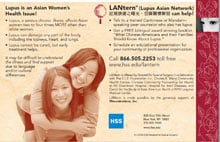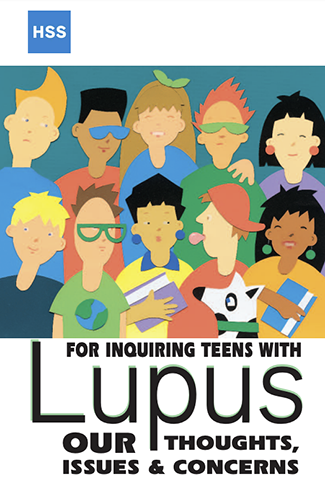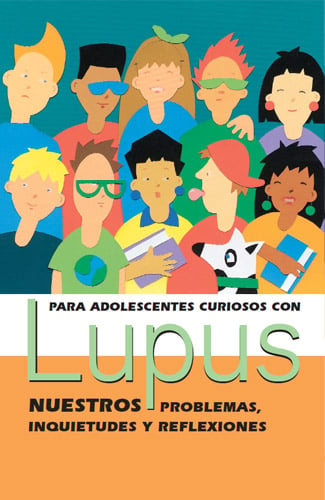- English
- 中文 (Chinese traditional)
LANtern® (Lupus Asian Network)
LANtern® (Lupus Asian Network) is the only national hospital-based bilingual support and education program dedicated to serving Asian Americans with lupus and their families. Lupus, often “invisible”, can be isolating and hard to understand. LANtern is here to help.
LANtern also collaborates with health care, multi-service, and community organizations to enhance awareness of lupus as an important Asian American health concern. Lupus affects Asians two to three times more than whites, and the illness may be more severe among Asians. Lupus cannot be cured, but earlier diagnosis and treatment helps.
Related Departments and Services
Hospital for Special Surgery's LANtern Program reaches out to the communities we seek to serve, with guidance from our Advisory Board members and the collaboration with many community organizations including: Charles B. Wang Community Health Center, Lupus Research Alliance, Chinese Community Partnership for Health at New York Presbyterian Lower Manhattan Hospital, Asian Health & Social Service Council, Visiting Nurse Service of New York and others.
LANtern® Support Line
866.505.2253 — toll-free
212.774.2508 — New York City
LANtern® (Lupus Asian Network), launched in 2003, is the only national peer support and education program for Asian Americans with lupus. Studies have indicated that lupus affects Asian Americans two to three times as often as whites. LANtern is a response to the need for greater lupus support, education, and recognition in the Asian American community.
Through community outreach, advocacy activities, and collaborations with local and national organizations, we seek to promote lupus awareness to medical professionals, social service providers, identified and potential lupus patients, and the general public. Our national bilingual Peer Support Line is designed to provide culturally-relevant services to Asian Americans who desire contact and solidarity with others who live with lupus. Our bilingual publications were written to address the questions and concerns of Asian American individuals with lupus and their families.
As part of the Department of Social Work Programs at the Hospital for Special Surgery (HSS), LANtern works closely with other culturally specific lupus support programs at HSS.
Our Mission
Our mission is to support, empower, and enhance the quality of life of Asian Americans with lupus and their families through our bilingual peer health education program. Our goal is to create and expand networks of hope and understanding, which will provide enlightenment concerning this complex illness.
Our Goals
- Provide culturally-specific and language-appropriate peer health education to Asian Americans and their families.
- Empower Asian American volunteers with lupus by training them as peer health educators and counselors.
- Enhance access, communication, and understanding among relevant health providers, patients, and community resources to improve knowledge and support regarding the impact of lupus in Asian American communities.
Advisory Board
The LANtern Advisory Board plays an integral role in supporting the program in its mission and linking LANtern with the broader community. Voluntary members have provided valuable guidance, resources, and community collaborations to continue its strategic growth and implement culturally relevant program initiatives. The Board is comprised of physicians, community leaders, and patient representatives. Our Advisory Board members have invaluable insight and years of experience working with community-based health promotion programs. They dedicate their time in a most committed and collaborative spirit.

Diane Gross, MPH, serves as the National Director of Program Development for the S.L.E. Lupus Foundation/Lupus Research Institute overseeing patient education programs, patient services, advocacy and the organization's Lupus Cooperative of NY program. Prior to joining the S.L.E. Lupus Foundation, Diane was the Director of Special Initiatives in the Office of the Medical Director at the national office of the March of Dimes Foundation where her primary responsibility was managing a federal grant to develop, evaluate and implement genetics education programs in minority communities. Diane began her career in NYC at the Health Systems Agency of New York City and then went on to serve as the Director of Strategic Planning and Development at HIP Health Plans. She has an MPH from the Columbia University School of Public Health.

Henrietta Ho-Asjoe, MPS, is Senior Director of Engagement and Collaborations at OneCity Health, NYC Health and Hospitals Corporation. She leads their DSRIP Project 11 to design and implement patient activation activities to engage, educate and link NYC's uninsured and Medicaid low- and non-utilizers to primary care. She is also responsible for their cultural competency programming development. She has extensive experience in public and community health, with a focus on raising awareness of health disparities, community impact, public health outreach, and program development. She is the Co-Editor of the Praeger Handbook of Asian American Health: Taking Notice and Taking Action (2009). She serves on the boards of several local and national nonprofits. She has served as a member of the LANtern Advisory Board since 2002.
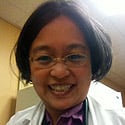
Cindy M. Hou, DO, MBA, is a patient and a physician. At the age of seven, she was diagnosed with systemic lupus erythematosus. She received experimental treatment at the National Institutes of Health. Despite her illness, she was able to graduate from Yale University and to receive her medical degree from the University of New England College of Osteopathic Medicine. Dr. Hou completed and infectious disease fellowship at Kennedy Health Systems/Rowan University – School of Osteopathic Medicine in Stratford, NJ. She is currently in private practice. At Kennedy Health System, Cindy is the physician chair of the Infection Control Committee, and is actively involved in the prevention of clostridium difficile (CDiff) and other healthcare associated infections. Since 2004, she has been involved with LANtern.

Philip J. Kahn, MD, is Assistant Professor of Pediatrics at NYU School of Medicine. He provides pediatrics rheumatology services at the NYU Langone Medical Center, Hospital of Joint Diseases, Bellevue Hospital, Woodhull Hospital and Maimonides Medical Center. In addition to his passion for clinical care, Dr. Kahn has a strong interest in education. He coordinates a yearly Pediatric Rheumatology seminar for clinicians as well as a selective for medical students in chronic care pediatrics three times a year. Dr. Kahn received his medical degree from Tel Aviv University, and completed pediatrics residency at NYU Langone Medical Center and pediatric rheumatology fellowship at New York-Presbyterian/Morgan Stanley Children's Hospital.

Kenny Kwong, PhD, LMSW, is Associate Professor at Touro College Graduate School of Social Work. He has worked as a social work practitioner and researcher and has extensive experiences in grant development, project planning, and evaluation in the areas of mental health, substance abuse, cancer, adolescent pregnancy prevention, cardiovascular health, and health literacy. Since 1995, Dr. Kwong has conducted numerous workshops and presentations in local and national conferences on the topics of immigrant health, cultural sensitivity, diabetes, tobacco control, and mental health. Since 2002, he has served as a member of the LANtern Advisory Board and has provided input and recommendations on programmatic and health outreach initiatives.

Michael Lockshin, MD, is an attending physician, Director Emeritus of the Barbara Volcker Center for Women and Rheumatic Disease and the Co-Director of Mary Kirkland Center for Lupus Research at Hospital for Special Surgery. He is also a Professor Emeritus of Medicine and Ob/Gyn at Weill Cornell Medical College. Dr. Lockshin is a pioneer in solving both the medical and personal healthcare issues that arise for patients with chronic illnesses. His latest book, The Prince at the Ruined Tower: Time, Uncertainty and Chronic Illness, is one that intimately examines these interrelated relationships among patients, doctors and our healthcare system. Dr. Lockshin has authored nearly 300 research papers, book chapters and books, most of which are on the topic of lupus, pregnancy, antiphospholipid syndrome, and sex differences in disease. From 2005-2010 he was the Editor-in-Chief of Arthritis & Rheumatism, rheumatology's premier journal. Dr. Lockshin graduated from Harvard College and Harvard Medical School; he did his rheumatology fellowship at Columbia-Presbyterian Hospital.

Karen Ng, MPH, is the founder of LANtern. She began raising awareness about lupus in the Asian American community in 2001. For over six years, Ms. Ng used her personal experience with lupus, her passion, and her leadership to bring national attention to the importance of LANtern services. She graduated from Cornell University and received her Masters in Public Health from Columbia University in 2009. She remains active by volunteering with Asian American non-profit organizations in New York City and gratefully acknowledges her family and friends who provide unconditional love and support.
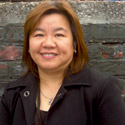
Ada Wong, RHIA, has served on the LANtern Advisory Board since 2009. She is Manager of the Chinese Community Partnership for Health and Volunteer Services Department at the New York Presbyterian Lower Manhattan Hospital. There, she oversees various programs and services that focus on health prevention and wellness in the Chinese American community in New York City. Her division proactively addresses the health needs of the underserved immigrants in the Chinese community, and reaches the larger Chinese American community through health screenings and education where people live and work. Ms. Wong has a degree in Health Information Management from SUNY Downstate Medical Center, and more than twenty years of community and healthcare experiences.

Arthur Yee, MD, PhD, is an Attending Physician at Hospital for Special Surgery (HSS), and Assistant Professor of Medicine at Weill Cornell Medical College, specializing in rheumatology. Additional specific expertise is sarcoidosis, SLE, spondyloarthropathies, rheumatoid arthritis, and crystalline arthropathies. Dr. Yee completed his undergraduate studies at Princeton University and obtained his MD and PhD degrees at NYU Medical School. Dr. Yee completed a residency program in internal medicine at Weill Cornell and a fellowship program in rheumatology at HSS. He has been an Attending Physician at HSS since 1997.

Yajie Zhu, EdD, holds a doctorate degree in Health Education from Columbia University, and is a Master Certified Health Education Specialist (MCHES). As the Director of Health Education Department at the Charles B. Wang Community Health Center, Dr. Zhu leads a multi-disciplinary team to apply an integrated approach to provide patient education and develop culturally sensitive and linguistically appropriate health education materials for patients and community members. Dr. Zhu is experienced in providing one-on-one patient counseling and community education on various health issues, and she is a strong advocate for equal access to health information and services for immigrant communities.
The History of LANtern
In 1999, Suzy Kim, LCSW, ACSW, then a student intern in the Social Work Programs Department in HSS, conducted a study to determine the need for a culturally specific program for Asian American patients with lupus. The report concluded that a peer-based health education program about lupus would benefit the Asian American community, which often faces barriers to accessing and utilizing information to cope with lupus effectively. LANtern was founded to connect Asian Americans living with lupus and their families to others who could understand, through personal experience, the impact of the illness on daily life and its cultural implications.
In 2003, LANtern was officially launched and conducted its first Peer Health Educator Training Program under the leadership of its founder, Karen Ng, MPH. The Peer Health Educator Training Program was established to teach individuals with lupus how to most effectively provide support and education to Asian American patients and their families. That year, the national LANtern Support Line went live.
Today it continues to bring support to individuals with lupus and their families. LANtern recognizes the importance of educating communities to dispel misconceptions about lupus and provide an optimal support network. The name of the program in Chinese means "lupus' guiding light." The lantern symbol connotes hope and light to people living with lupus and to their families.
Timeline
2001
- Asian American outreach initiative is introduced to rheumatologists (in conjunction with the S.L.E. Lupus Foundation)
- First Advisory Board meeting convenes in December under the name A.B.L.E. (Asians for the Betterment of Lupus Education)
- First project completed: "Lupus Health Provider Directory for Asian Americans in Greater New York"
- First professional conference presentation at the American College of Rheumatology/ Association of Rheumatology Health Professionals Annual Scientific Meeting. Presentation entitled, "A needs assessment to identify psychoeducational concerns of Asian Americans with lupus: Can a peer volunteer program work?"
- Grant funding from Rheuminations, Inc., makes A.B.L.E. possible
- Program name is officially changed to LANtern® (Lupus Asian Network)
- LANtern releases award-winning booklet "What Chinese Americans and Their Families Should Know About Lupus"
- First LANtern Peer Health Educators training is conducted
- LANtern Support Line goes live!
- Outreach to national Asian American health organizations takes place in California
- First "Meet & Greet" among participants, peer counselors, and advisory board members of LANtern and its sister lupus support programs (Charla de Lupus and LupusLine) is held in Chinatown to help create a sense of community
- Second LANtern Peer Health Educators training is conducted
- LANtern brochures "Lupus: Myths & Facts" and "Talking About Lupus" are developed and printed for wide distribution
- LANtern conducts on-site presence at Bellevue Medical Center Lupus Clinic
- Second "Meet & Greet" held in Chinatown
- Filipino American Human Services, Inc., (FAHSI) Benefit Performance features a play about lupus and dedicates it to LANtern
- Third LANtern Peer Health Educators training takes place
- Third "Meet & Greet" held at HSS
- LANtern, along with HSS lupus support programs Charla de Lupus and LupusLine, participates as a community partner in the Office of Women's Health's National Lupus Awareness Campaign. At the campaign launch in March, founder Karen Ng shares her personal journey with lupus, promoting lupus awareness among Asian Americans
- LANtern conducts its first two radio broadcasts on a Chinese radio station, Chung Wah Chinese Broadcasting Company. The first broadcast is held in conjunction with Chinese Community Partnership for Health at the NewYork-Presbyterian Lower Manhattan Hospital. The second broadcast is held in collaboration with the Asian Health & Social Service Council, through an invitation from the Visiting Nurse Service of New York.
- LANtern is one of five programs to represent Hospital for Special Surgery's Community Service Plan for the New York State Department of Health's Prevention Agenda Toward the Healthiest State initiative, with the goals of building capacity with targeted organizations to increase awareness of lupus as an Asian American health concern, and to promote the need for early identification, diagnosis, and treatment of lupus in the Asian American community.
Whether you have lupus or you know someone with lupus, LANtern is here to help you.
LANtern offers four main services:
- Peer Support Program
- Support Line
- Bilingual Publications (see the Publications tab)
- Presentations
- LANtern Collaborations
Peer Support Program
HSS and Lupus Foundation of America are pleased to offer lupus support groups for the Asian community in both Cantonese and English. Our bilingual peer health education program connects people from near and far with the appropriate knowledge, resources, and support to cope well with lupus.

Come join a free Asian support group where you can learn about lupus, share coping strategies, and feel supported on your lupus journey. Please see our calendar below:
Cantonese-Speaking Support Group (Virtual)
Meets quarterly on the 4th Saturday at 11AM - 12:30PM Eastern
January 25
April 26
July 26
October 25
Facilitator: Eliza Ngan, BA
LANtern® (Lupus Asian Network), HSS
For more information:
Phone: 646.797.8338
Email: lantern@hss.edu
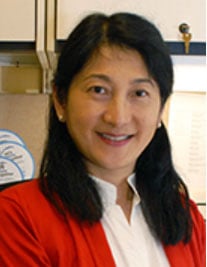
English-Speaking Support Group (Virtual)
Meets every month on the 3rd Thursday at 6PM - 7:30PM Pacific (excluding April, July and August)
February 19
March 19
May 21
June 18
September 17
October 15
November 19
December 17
Facilitator: Karen Ng, MPH
Lupus Foundation of America
For more information:
Email: LFAasiangroup@gmail.com
Website: lupus.org/SoCal
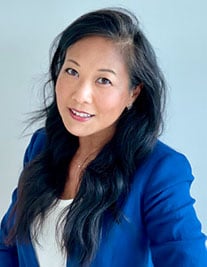
Support Line
Did you just find out you have lupus? Are you looking for more information about local resources and referrals? Are you trying to learn more about lupus for your loved one? Do you want to talk to someone else who also has lupus to share your experiences and stories?
You can access direct assistance by calling our Support Line and speaking with our bilingual Program Manager. The manager can also connect you with one of our Peer Health Educators.
Call the LANtern® SupportLine today:
866.505.2253 outside NYC (toll-free)
or 212.774.2508 in New York City
Email: lantern@hss.edu
LANtern offers peer health education and social work support through our toll-free telephone SupportLine. We understand how hard it can be to comprehend a medical diagnosis. We understand how language obstacles may prevent you from finding the proper support. We understand that there may be certain issues that are important to you.
We have trained volunteers – people who have lupus or have family members with lupus – who can speak to you over the phone and help you clarify concerns and work effectively with your health care team. You can call our SupportLine from your home or office. LANtern’s SupportLine is also available in Cantonese, Mandarin and a few other Asian languages/dialects. We can provide support and education by phone appointment at times that are best for both of you - daytime, evenings, or weekends.
You can leave a voice mail message at any time. Tell us the best times to reach you. Your call will be returned by our program as soon as possible. After a screening phone call to assess your personal needs, you may be matched with a trained peer health educator.
Presentations
Are you a healthcare provider interested in an in-service training for you and your colleagues? Are you part of a community, medical, professional, multi-service agency or would like to learn more about a disease that affects Asian-Americans at a higher prevalence?
LANtern offers presentations to increase awareness and education about lupus to both medical and social service agency providers and the general community. We have medical experts who can speak about early identification and diagnosis of lupus and why it is particularly relevant to the Chinese community. We have trained volunteers who can share their experiences and insights about living with lupus.
Schedule a Presentation
Please contact the Senior Manager at 212.774.2508 or lantern@hss.edu to further discuss and arrange a LANtern presentation.
LANtern Collaborations
LANtern participates in capacity building with a variety of community-based, professional, advocacy, and multi-service organizations at the local, regional, and national levels to achieve its goal of increasing awareness of lupus as an important Asian American health concern. In support of Hospital for Special Surgery’s Community Service Plan (CSP) for the New York State Department of Health’s Prevention Agenda Toward the Healthiest State, LANtern has formed numerous community partnerships to promote the need for early identification, diagnosis, and treatment of lupus among Asian Americans.
In addition to our CSP partners, LANtern reaches Asian American communities through our collaborative relationships with members of our Advisory Board and their associated organizations.
LANtern Community Service Plan Partners include but is not limited to the following:
- Asian American/Asian Research Institute at CUNY
- Asian Health & Social Service Council
- Charles B. Wang Community Health Center
- Chinese-American Planning Council
- Chinese Community Partnership for Health at NewYork-Presbyterian Lower Manhattan Hospital
- Gouverneur Healthcare Services, New York City Health and Hospitals Corporation
- Hospital for Joint Diseases
- New York Chinese American Association
- NewYork-Presbyterian Lower Manhattan Hospital
- NYU Center for the Study of Asian American Health
- Office on Women’s Health (OWH), U.S. Department of Health & Human Services
Additional Collaborations
LANtern always welcomes opportunities to collaborate with other organizations. Since 2003, LANtern has participated in many collaborative presentations, events, and programs.
LANtern is made possible through funding by Rheuminations, Inc.
Bilingual Publications
Do you want bilingual (Chinese/English) materials that you can share with your family members and friends?
LANtern offers bilingual resources about lupus that specifically address issues important to the Chinese community. They are designed to help you and your loved ones understand lupus. They may also help to facilitate discussion around how to cope with the impact of having this chronic illness. You can read them online, download them, or request free single copies to be sent to you. For specific medical advice, seek the services of your personal health provider.
Lupus: Myths & Facts
Addresses common misconceptions about lupus, answers questions about the disease, and explains basic facts about lupus in a way that is easy to understand.
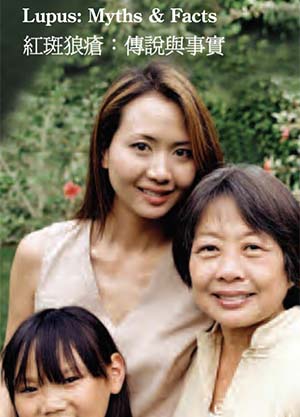
Talking About Lupus.
It can be hard to talk about lupus – with both your doctor, as well as family and friends. This publication provides tips to make it easier.
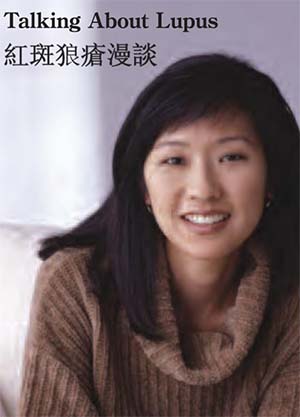
LANtern Information Sheet
This postcard contains a description of LANtern’s services and how we can be reached.
What Chinese Americans and Their Families Should Know About Lupus.
If you have been recently diagnosed with lupus or have been living with it for some time, this award-winning 20-page booklet will help you manage the illness with strength and sensitivity. For a free copy of this booklet, please see the directions below for ordering a publication.
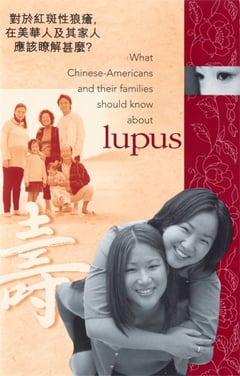
For Inquiring Teens with Lupus: Our Thoughts, Issues, & Concerns
If you are a teenager with lupus, this booklet written by a young woman diagnosed with lupus as a teen has an “insider” perspective. This booklet takes into account some of the specific issues, both medical and emotional, relevant to teens living with the illness.
Ordering
To order free printed copies of any of these publications, please call 212.774.2508 or email lantern@hss.edu with the following: your name, your mailing address, the requested brochure(s), and if you’d like to be included in our mailing list of LANtern events.
LANtern Video Resources
How Lupus Impacts Asian Americans and Pacific Islanders
Program Supervisor for LANtern® (Lupus Asian Network), Eliza Ngan-Dittgen, discusses stigmas that may impact the health of someone of Asian decent, ways to combat these stigmas, and the importance of community support.
Lupus & Covid-19 Update: One Year Later with Q&A by Arthur Yee, MD「紅斑狼瘡與新型冠狀流感:健康資訊及問答時段」余醫生, 風濕專科
Arthur Yee, MD, PhD, looks retrospectively at the COVID-19 virus, the new variants and how the vaccines work to defend the body. Translated into Cantonese
Shortly after LANtern was launched back in 2003, a special celebration was held in collaboration with Hospital for Special Surgery’s sister lupus programs, LupusLine® and Charla de Lupus (Lupus Chat)®, to unite program participants in a "Lupus across Cultures" banquet. LANtern is proud to host events throughout the year to foster a sense of community among our clients, volunteers, and supporters. For more information on our events or to RSVP, call us at 212.774.2508 or 866.505.2253 (toll-free) or email us at lantern@hss.edu
The following occur every year:
LANtern’s Lunar New Year Luncheon (Feb/March)
Since 2008, this annual gathering in Chinatown brings together program members and their guests to meet each other, celebrate the holiday, and share stories. Each year, discussions are led by health providers and draw upon a specific theme focusing on self-efficacy and coping strategies. This is LANtern’s most popular and delicious social event.
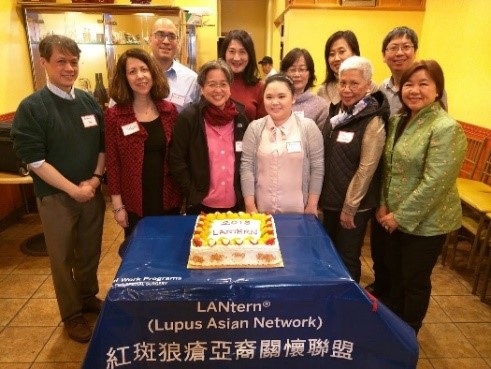
The LANtern Lunar New Year Luncheon.
Living Life Healthy with Lupus (May)
Since 2008, this annual wellness event coincides with Lupus Awareness Month in May and highlights an educational presentation that is theme-focused. Offered in collaboration with LANtern’s sister programs, LupusLine®, Charla de Lupus (Lupus Chat)®, and SLE Workshop at Hospital for Special Surgery, and our co-sponsor, the Lupus Research Alliance.
LANtern’s Health & Wellness Day (June)
Since 2012, this annual wellness event is open to all community members to increase knowledge and public awareness of lupus. Past themes have included:
- Master Sitan Chen’s Tai Chi demonstration at our annual Lupus Health & Wellness Day (in Chinese)
- Lupus and COVID-19: A Q&A Session
- "Coping with Uncertainty in Lupus: Physician and Patient Perspectives"
- "Lupus Treatment through the Cultural Lens"
- "Managing Joint Pain, Arthritis, and Lupus"
- "Western Medications for Lupus: What Do I Need to Know?"
- "Understanding Lupus and Your Treatment: From the Perspective of a Physician/Patient with Lupus
Lupus Research Alliance (LRA) Walk with Us (October)
Since 2004, LANtern has led a team every October to support the LRA’s Walk with Us to Cure Lupus event.
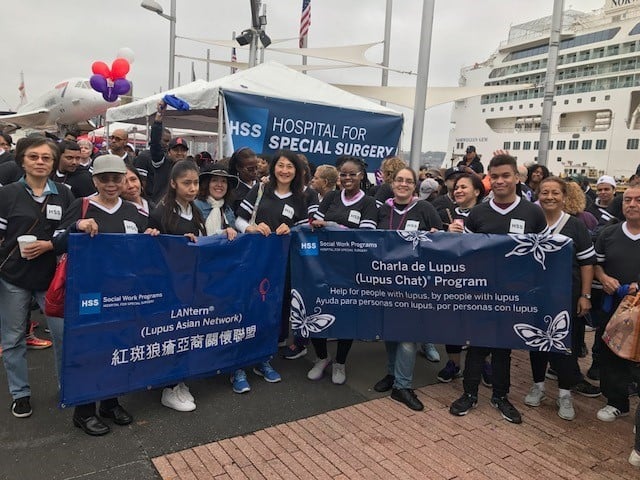
Community Programs and Events
Workshops & Lectures – LANtern cultivates numerous community partnerships in Manhattan, Brooklyn, and Flushing to promote the need for early identification, diagnosis, and treatment of lupus among Asian Americans. Programs are geared towards the audience and can be offered in English, Cantonese, or Mandarin. Besides introducing the basics about the disease, topics that are more specific have included:
- "Arthritis and Rheumatic Diseases: What You Should Know"
- Lupus Awareness Seminar: What the Asian Community Needs to Know
- Lupus and the Asian Community: A Puzzle to Ponder – Asian American / Asian Research Institute (aaari.info)
- Coping with the Emotional Impact of Lupus
- Lupus & the Kidneys
- Caring for Your Family with a Chronic Illness
Collaborating community partners and sponsors have included: Asian American/Asian Research Institute at CUNY, Asian Health & Social Services Council, Charles B. Wang Community Health Center, Chinese Community Partnership for Health, Maimonides Medical Center, Manning Confucius Pharmacy, Metropolitan Jewish Health System, New York Chinese American Association, University Settlement, Visiting Nurse Service of NY.
Community Events – LANtern strives to engage community members in learning more about lupus. These are a few that we are pleased to have participated in:
- Asian American and Pacific Islander Heritage Festival
- Charles B. Wang Community Health Center "Good Health Day"
- Chinese American Planning Council’s Family Day Fair
- CUNY Health and Wellness Fair at LaGuardia Community College in Queens
- New York Presbyterian Lower Manhattan Hospital’s Chinese Community Partnership for Health’s "Downtown Wellness Day"
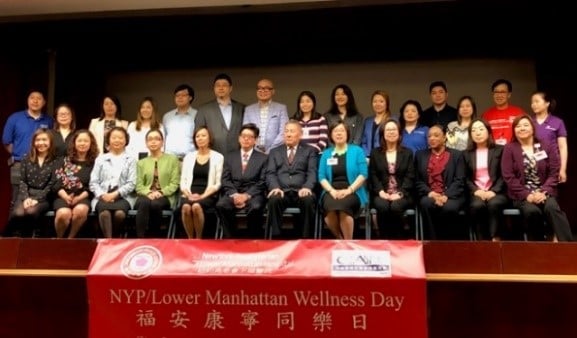
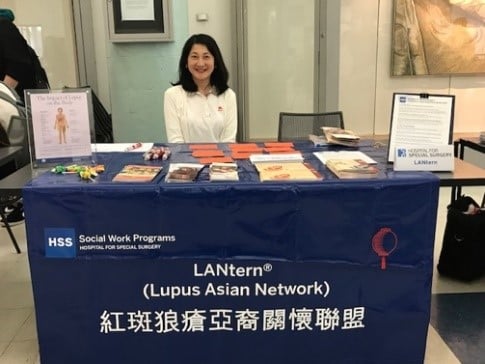
For Professionals
Since its inception, LANtern welcomes opportunities to educate health professionals, both at the national and local level, about the prevalence and impact of lupus in the Asian American community.
Our faculty physicians, social workers, and LANtern team contribute their time and expertise to enhance the knowledge of lupus. Our community partners assist with planning and promotion of these events.
Professional education has included the following range of topics:
- Systemic Lupus Erythematosus: A Primary Care Perspective
- Lupus & Pregnancy
- Lupus in the Age of COVID-19
- Neuro-psychiatric Aspects of Lupus
- Pregnancy Care of Lupus Patients
- Lupus: Chronicity, Ethnicity and Psychiatry
- Lupus from Cultural & Mental Health Perspectives
- Lupus in Pediatrics/Adolescents
- Grand Rounds at Charles B. Wang Community Health Center
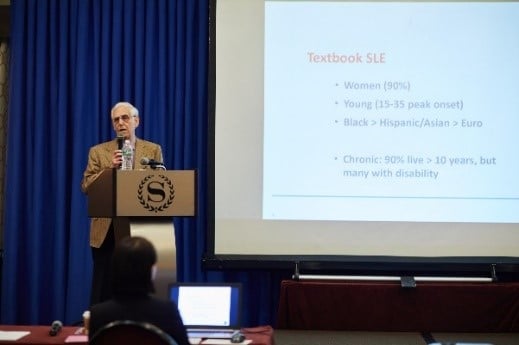
Dr. Michael Lockshin presenting on SLE.
Presentations at conferences & meetings have included
- Chinese American Medical Society (CAMS) Seminar
- "The Evolving Landscape of Sarcoidosis"
- "Research Updates on COVID-19 and Rheumatic Diseases"
- "SLE in the Age of COVID-19 (New Thoughts)"
- “Lupus and the Asian Community”
- Association of Chinese American Physicians (ACAP) Convention
“SLE: One Disease, Many Diseases” - Asian American Women’s Health Symposium
"A Woman’s Health across a Lifespan" - American College of Rheumatology/Association of Rheumatology Health Professionals (ACR/ARHP) Annual Conference
"Peer Counseling Interventions for Culturally Diverse Adults & Teens with Lupus – LANtern: A model for Serving Chinese-Americans and Their Families"
"LANtern: Evaluation of an Innovative National Program" (PDF)
"LANtern: Strategies for Achieving Cultural Relevance for Lupus Education and Support" - Asian Health & Social Service Council Meeting
"Lupus and our Asian Community"
"Emotional Health in Living with a Chronic Condition on Patients & Caregivers" - Asian Pacific American Medical Student Association Lupus Conference
"An Interactive Panel Presentation for Enhanced Knowledge about Lupus in Adults and Children, Antiphospholipid Syndrome, and Cross-Cultural Practices in Healthcare"
"First Day after Diagnosis: Establishing Relationships with Patients" - Asian Pacific American Medical Student Association NE Conference
"The Missing Pieces in APIA (Asia Pacific Islander American) Healthcare" - American Public Health Association (APHA) Annual Conference
"LANtern: Bringing Lupus into the Asian American Limelight" (PDF)
"LANtern: An Innovative Approach to Empower Women with Lupus & Their Families" (PDF) - Center for the Study of Asian American Health Conference
"Empowering Community Members through Peer Advocate Models" - Chinese American Medical Society’s Annual Scientific Meeting/16th Federation of Chinese American and Chinese Canadian Medical Society’s Annual Conference
- Chinese-American Planning Council Meeting
"Lupus in the Chinese Community – Why Should We Care?" - Greater New York Health Association Community Affairs Meeting
"HSS Models for Serving Culturally Diverse Lupus Patients & Families" - Health Care of the Chinese in North America Conference
"LANtern: An Innovative Health Education, Empowerment and Outreach Initiative for Chinese-Americans with SLE" - Minority Access, Inc. National Role Models Conference
"Enhancing Research and Treatment Gaps to Close the Health Disparities Gap"
To schedule an educational presentation at your agency, call us at 212.774.2508 or 866.505.2253 (toll-free) or email us at lantern@hss.edu.
Volunteer or Share Your Story
We invite you to be a part of LANtern’s work by volunteering, or by sharing stories of your experience with lupus. In addition, please check News and Events tab on this page for opportunities to meet us at future events.
Volunteering Opportunities
Volunteers are the heart and soul of our LANtern program. LANtern volunteers are needed to assist with special projects in peer health education, community outreach, evaluation of programs, and administration. They represent the program when participating in community events and health fairs. A number of our volunteers have also used their experience with LANtern to fulfill internship hours. We are looking for motivated, responsible, and reliable volunteers who will use their experience and talents to enrich the program.
Peer Health Educator
If your life has been touched by lupus, you have a unique perspective that you can use to help others. Become a LANtern Peer Health Educator by learning about lupus, developing your listening skills, and improving your ability to recommend effective coping mechanisms. We offer comprehensive peer health educator training sessions that volunteers find very rewarding and personally enriching. Email lantern@hss.edu or call 212.774.2508 for more information. Bilingual language abilities are preferred but not required.
Program Volunteer
If you are interested in learning about how a chronic illness affects patients and their families, developing cultural competency skills, working with a healthcare team, and making a difference in the Asian American community, become a LANtern Program Volunteer. There are many specific projects that should be a good match for your talents and interests. Email lantern@hss.edu or call 212.774.2508 for more information.
Share Your Story
Another way to get involved is to share your story as an Asian American living with lupus, or as a family member of someone with lupus, and how LANtern has helped create a sense of community. If you are interested in sharing your story about how LANtern has helped you cope with lupus or made an impact on your life and others, please feel free to email lantern@hss.edu. We welcome your stories of strength, courage, and inspiration.
Program Patient Stories
Below, you will find some stories of individuals who connected with LANtern and wanted to pass on their encouragement to you.
Connie
How HSS Changed My Life
I was diagnosed with lupus nearly 20 years ago. Fortunately, lupus only attacked my skin, so the doctor at the time said that I didn’t need to take medicine because the side effects of taking medicine are far greater than those of not taking medicine. This state has continued until the last 5 years or so. I have suffered from an increasingly bad migraine headache. I have seen a number of Western and Chinese doctors. In addition, I have other illnesses. I tried many different treatments and could not find a solution. The costs of various examinations was very expensive, it added to the financial pressure.
Every time I saw a specialist, I would usually see him/her once as I would avoid the expensive consultation fees of follow-up visits. I ended up making all kinds of self-evaluation/medication on my own, but to no avail. Persistent symptoms of low-grade fever, joint pains, and severe hair loss and heart palpitations began to appear two years ago. I felt stressed about my condition which was getting serious and unpredictable - sometimes it seemed better but other times worse. I was worried about the high medical costs in the United States and not being able to find the right doctor. I felt that my mental stress was making my lupus worse.

So I turned to the internet trying to search for information. I discovered LANtern®(Lupus Asian Network) at HSS by accident. At that time, I just wanted help for recommendation of a good rheumatologist. Eliza Ngan-Dittgen, LANtern Program Supervisor, responded to me quickly and called to chat. She suggested several Asian doctors who speak my language and are highly regarded. During the calls, Eliza learned that I did not have medical insurance in the United States, she offered to help me to find solutions without giving me any pressure. In Asia, people generally feel uncomfortable accepting financial assistance. It was difficult to clearly describe how to feel at the time. In fact, this disease bothers me a lot. For years, I have looked healthy and normal, but I am often in indescribable fatigue. I have to be strong and work to support my family. Because of the financial burden, I have been trying to ignore my health although I am aware that the consequences can be very serious. I believe this kind of pressure has been hiding in my subconscious mind. When certain symptoms appeared, I was very scared but felt helpless to solve it. So when Eliza told me that she would try to help me to resolve the financial issues, I suddenly felt like someone had lifted a heavy load off my shoulders and told me, ”you can take a good rest now”. Yes, this was how I felt. I had not even seen the doctor for my illness, but I already felt hopeful. Eliza reached out to Randy Rodriguez, Voices Medicaid Education Program Supervisor, who worked collaboratively with HSS Financial Assistance Program (Stacy Hamilton) to expedite my application. They have solved the biggest crisis in my life, I am so relieved. I can finally treat my lupus without worries and distractions! If I am not healthy, my life and my family will have nothing. I am grateful to HSS for helping me to regain confidence in life without losing dignity.
I would like to thank Eliza, Dr. Weijia Yuan, a HSS rheumatology specialist, Randy and Stacy. Eliza especially communicated with Dr. Yuan about my situation; Dr. Yuan immediately stated that even without financial assistance, she could waive the consultation fee. I am very grateful to Dr. Yuan’s kindness; this is a noble quality. After meeting with Dr. Yuan, I have full confidence in her. Her experience, skills and care for patients empower me; I no longer feel helpless and afraid, even when I saw the poor results of my lab reports.
I hope that more patients suffering from lupus will be as lucky as me and be able to get the help they need. There is warmth in this world, I met angels at HSS who bring hope and strength to patients like me.
- Connie
Anonymous Male
"The biggest challenge of lupus is to admit that I have this disease and to maintain a relaxed attitude. The most difficult about lupus is feeling tired all the time. To combat the tiredness, I will stay at home and take naps, or sit and listen to music and relax. It’s hard to take breaks at work. The only thing I can do is to slow down the pace of work. Even though I’m tired constantly, I still keep up with the habits of jogging every day, visiting the gym twice a week and a normal life with relatives and friends. Relatives and friends are an important factor in helping me face lupus and overcome psychological obstacles. They are the people who inspire me and give me hope to live when I want to isolate myself. While I am trying to get better and continue my normal life, it is important to maintain a positive attitude. In order to maintain a positive attitude, I maintain a normal and healthy lifestyle through continuous exercise and a good diet. I keep telling myself that although I have lupus, it does not define me because I am in control of it, not the other way round.

LANtern®(Lupus Asian Network) helped me connect with peer health educators and other patients with lupus to share our experience and discuss our concerns. These shared experiences bring us hope, comfort and encouragement, making us stronger and not feeling lonely and helpless. I remember that Karen Ng was the first peer health educator who contacted me when I was diagnosed with lupus. She provided me with the knowledge of lupus and gave me hope that everything would get better, and then I really got better. Until now, I am still very grateful to her for the encouragement she gave me at that time! "
– Anonymous
Jenny L.
I am a full time mom of one child. My lupus started ten years ago right after my son was born. My biggest challenge with lupus is my joint pain. When it flares up, the pain in my back, elbows, and hands makes it very difficult for me to do house work, much less care for my baby. I was clearly frustrated. Thanks to my doctor, under her care, my pain improved remarkably and is manageable in general. Today, my son is big and strong and is able to help around the house. My family always gives me the love and support that I need all along. I am still a lupus patient but I am happy. With this chronic disease, it is important to communicate with your rheumatologist on a regular basis in order to get the proper treatment. I know that when my lupus is in remission, I can live a normal life just like everyone else. That said, I will still listen carefully to my body – know when to slow down, get rest, and work wisely.
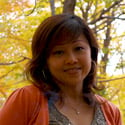
LANtern helps me understand a great deal about lupus. The knowledge I gained over the years has allayed most of my fear arising from this illness. I understand how it happens, what can be done, and what not to do. At LANtern, I have the opportunity to “vent out” to my peers and it often gives me a peace of mind afterwards. It is comforting to know that I am not alone in this journey. As a group, we can make our voice heard. We hope that an increased public awareness will lead to greater funding and research efforts towards a cure for this disease.
-Jenny L.
Vicki
It all started with a rash on my face that was shaped like a butterfly back in May, 2003. My mom took me to her general doctor and the doctor told me it was mere acne and not to worry about it. However, for the six months that followed; I experienced hair loss, fever and fatigue. On the other hand, my dermatologist was trying to figure out my acne problem by prescribing different kinds of antibiotics. Nothing worked and I was feeling horrible day after day. The truth finally came on the day when I was referred to an experienced Rheumatologist at Hospital for Special Surgery. Numerous lab tests later, I was swiftly diagnosed with lupus and was put on medication right away. No wonder lupus is nicknamed: “The great imitator” – which features non-specific symptoms and may be confused with a number of other diseases. While it could be a relief that my six-month ordeal came to a conclusion at long last, it was also a shock as I was not at all aware of this illness at the time. I eventually came to terms with my life with lupus which, in turn, gradually descended into remission. As the years ensued, I was basically medicine-free and was living an active life style marked by one high point event after the other - running the New York Marathon in 2006, getting married in 2007 and having a baby in 2009 – to name a few.
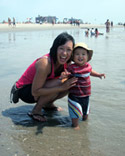
The fact is, stress and lupus do not go together. Not surprisingly, it was during my pregnancy that my lupus flared up, for it had obviously generated considerable amount of stress to my body and mind. Nonetheless, the good news is my son was born healthy months later and I am slowly getting better with the help of medical treatment as well. My son is truly a gift and he brings us pride and joy. In retrospect, I feel extremely fortunate to have the support and love from everyone in my family who helped (still do!) me through the difficult times.
When I first came in contact with LANtern, its comprehensive resources provided me with everything I wanted to know about lupus. My experience as a Peer Health Educator for the program has also been invaluable. While I am reaching out to other patients, I am learning how lupus can impact people’s life in so many different ways. I appreciate every opportunity to speak with our callers as it helps me understand that each person has different concerns and different ways to deal with lupus. It is consoling to know that I am not alone in the journey with lupus and empowering to be able to educate others about this illness or answer some of their concerns."
-Vicki, pictured with her son
Anonymous Female
I was originally from China and went to medical school in China. After graduating from medical school, I got married and gave birth to a son. During my medical studies and practice, I started to notice annoying tiredness and didn't care about it at first. I thought it was from the work pressure of being a medical worker and managing my career and family. However, the symptoms were getting worse and worse. In addition to getting tired easily, the knees and finger joints also started to ache. At the end of the day, my ankles got swollen. When I got up in the morning, my eyelids were swollen. At that time, the doctor diagnosed that I had nephritis and started treatment. I was feeling doubtful; nephritis should not be so serious that it affected my body functions. My doctor suspected that I had lupus but undiagnosed, because all test indicators were normal except for urine tests.

My family and I immigrated to the United States a few years later. As soon as I came to this country, my life changed in a completely new cultural and language environment. Soon my symptoms worsened. Fatigue and joint pain became worse. I also started to have fever, facial rash, dry mouth, shortness of breath, anemia, swelling in legs and eyelids became more obvious. Almost every joint was stiff in the morning. After a series of tests, I was diagnosed with lupus. I think it was the stress that had affected my health.
The biggest challenge facing lupus is to endure chronic fatigue and not sure when another symptom or inflammation will creep into my life. After I was diagnosed with lupus, it took a long time for me to adjust including my mood. Living with lupus, these negative emotions still appear from time to time. I must put aside my dream career because my health condition does not allow it.
However, I still use a positive attitude to fight against the limitations and difficulties in life. I began to learn to have fun from the little things in life, such as finding simple pleasure in my long commute to work, volunteering in LANtern®’s activities, and helping others as much as I can.
The person who has provided the most help and support in my life is my husband. He has no complaints. No matter how big or small things are, he is my strongest pillar. For example, when I go out to work, he will cook and do housework. Even though he works hard all day, he is still happy to help with housework. I also learned not to put too much pressure on myself, and to listen to my body. I learned not to waste precious time in regrets. Although I didn’t achieve my dream of being a doctor, I have got my family members whom I am proud of.
Through LANtern®, I got to know many patients with lupus. I used to feel very lonely because I didn't want others to know that I have lupus. Now I know that I am not alone, and that I can have a spiritual communication with other people who understand my feelings. Through the participation in LANtern’s activities and volunteering, I also have the great opportunity to learn more about lupus.
- Anonymous Female
Diana S. Meng
In 1981, my 7-year-old daughter Cindy was very ill. She had a high fever, nausea and vomiting. Her urine was pink. We were very worried about her and didn’t know what happened. My husband and I took her there. She saw her pediatric physician and was admitted to a local hospital. The doctor found a butterfly-shaped rash on her face. Her kidneys were not functioning normally. Cindy did a series of tests and saw many doctors. After two weeks, she was transferred to another hospital.
At the Milton St. Hersey Medical Center in Pennsylvania, the doctors conducted more tests on Cindy. I accompanied her every night. One night, I even heard the fire alarm go off and I was worried about the hospital how to remove everyone out of the hospital, especially Cindy, because she was very weak. Fortunately, we did not need to evacuate. The doctor took her into the operating room and removed a small piece of kidney for diagnosis. On the day our doctor informed me and my husband of Cindy’s diagnosis. It changed our lives with Cindy forever. She has lupus, which we have never heard of.
Because Cindy's lupus affected her kidneys, she had to take a high-dose steroid medicine called Prednisone. The drug made her hungry easily and increased her appetite. Her face became like a full moon face, round and swollen.
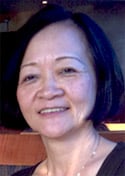
Despite these pains, Cindy never complained. I remember when the nurse couldn't get blood from her arm, she never cried. She also took another medicine called Imuran. However, she still did not get better. Cindy was very tired when she came home from school and had to take a short nap to regain some energy. She was pale, anemic, and needed a blood transfusion. In 1985, the grace of God fell on her, and a friend of mine recommended her to the National Institutes of Health (NIH).
At the NIH, Cindy received an experimental drug called cyclophosphamide (Cytoxan), which was injected intravenously. We met a very good doctor who treated Cindy like his daughter. Fortunately, we only needed to drive 2 hours each trip to the NIH for treatment. I always stayed by Cindy's side because Cyclophosphamide made her sick and vomit at any time. The week after the infusion, she would feel very tired. Cyclophosphamide also caused hair loss. I found a lot of hair on her pillow, bathroom and clothes. Even when I stroked her hair, several strands would fall off. However, she never complained. Over the years, Cindy had done several kidney biopsies. Finally, after seven years of medication, her doctor decided to stop the intravenous treatment and let her start taking a drug called Lisinopril to try to reduce the amount of protein excreted in the urine.
With these treatments controlling her condition, Cindy graduated from high school with the best grades. Then, she entered Yale University, her first choice. After that, she did some research on lupus and gave a keynote speech in the community. Then, she entered the Boston University Graduate School and got a double master's degree. However, she did not give up her truest dream, which was to become a doctor and help others, just like her doctor did for her. Cindy graduated with a degree in osteopathic medicine from the University of New England College of Osteopathic Medicine (UNECOM). Cindy studied Asian lupus during medical school and discovered an organization called LANtern®(Lupus Asian Network). She joined this lupus patient support program voluntarily and became a member of their Advisory Board Committee. Cindy is still a current Advisory Board member of LANtern®.
After completing her medical school, she completed a residency in internal medicine in New Jersey. In the second year of the internship, she began to experience unstoppable nose bleeding, and the blood would still flow out of her mouth. She has immune thrombocytopenic purpura (ITP), or platelet deficiency. She took different drugs, such as steroids, and intravenous drugs such as Rituxan and WinRho. After caring for patients for 24 hours as an intern, she would drive to the infusion center for treatment. Cindy hadn't been so seriously ill for a long time. When her condition worsened, she eventually went to the emergency room in the middle of the night due to high fever and bleeding. She was in the hospital one night and she looked very pale. I kept looking around on the hospital floor, and thank God, her doctor was on the same floor! He sent her to the intensive care unit. A few days later, the hospital let her go home. Soon after, she had to return to the hospital because of ITP. This time, she had to undergo surgery to remove the spleen to improve the condition of low platelets.
Since she went in and out of the hospital twice, and underwent surgery, she had to temporarily stop her internship. Cindy decided to present her case for morning report and teach others about lupus and ITP. At the end of that year, the hospital awarded her the Best Case Publication Award. When she finished her internship, I was very proud of her. She then became an infectious disease researcher. Now, she is a specialist in infectious diseases. I am lucky and proud to have my daughter, Cindy. Even though she was diagnosed with lupus in 1981, she continues to live and fight hard. I hope that if you have lupus, you will learn to overcome it.
-Diana S. Meng
LANtern in the News
LANtern has been featured in a variety of media channels, both English and Chinese-language outlets, to educate audiences about lupus and increase awareness of how LANtern can help.
- World Journal Newspaper “Chinese Planning Council’s Family Day Fair” (Chinese)
- Sing Tao Daily Newspaper “Lupus Talk” (Chinese)
- World Journal Newspaper “Lupus & Acupuncture” (Chinese)
- World Journal Newspaper “Coping with Uncertainties of Lupus” (Chinese)
- Audrey Magazine. “Living with Lupus”. Founder of LANtern and lupus patient Karen Ng describes her experiences as a lupus patient. This article also profiles the courageous story of another patient living with lupus.
Multimedia
- Lupus Research Alliance Celebrates Asian American Pacific Islander Heritage Month: An Interview with Eliza Ngan-Dittgen, Program Supervisor, LANtern®(Lupus Asian Network)
- Asian American/Asian Research Institute at City University of New York. Lupus Awareness Seminar: What the Asian Community Needs to Know. Our distinguished panelists raised awareness about the prevalence of lupus in the Asian American community.
- Asian American Women’s Health Symposium. A Woman’s Health Across a Lifespan. The video features My-Lan Tran and Dr. Cindy Hou, LANtern Advisory Board member and lupus patient. At this New York City symposium, LANtern talked with members of the community about living with lupus and the importance of raising awareness about lupus.
- Chung Wah Chinese Broadcasting Company. At the invitation of the Chinese Community Partnership for Health, LANtern conducted its first radio presentation about lupus. The presentation introduced the LANtern program to a tristate Chinese speaking audience.
- Office of Women’s Health National Lupus Awareness Campaign Launch. In this clip, LANtern founder Karen Ng talks about her personal experience with lupus and how the National Lupus Awareness Campaign will benefit others with lupus.
Additional Resources on Lupus
On our website, you will find extensive information about lupus.
You might be wondering about how lupus may affect specific parts of your body, including your heart and kidneys. Along with medications for lupus, you may be curious about acupuncture or complementary and alternative therapies for pain and their interactions with lupus. It’s important to understand the impact that lupus medications may have on your mood. If you are having difficulty coping with the stress of managing lupus, speak with your doctor and find support from families, friends, or the LANtern program.
The Lupus and APS Center is a fully integrated center that facilitate individualized and state-of-the-art patient care and research and offer special patient education articles and reports developed by HSS rheumatologists and other experts on lupus. In addition, visit the SLE Workshop page for summaries of presentations by lupus experts. For more articles about lupus, check out the Lupus (SLE) page on the HSS website.
In addition to the resources on the LANtern and HSS web sites, you will find more lupus-related information on the following web sites:
Helpful Links
Lupus Related Patient Service and/or Research Organizations:
- Arthritis Foundation
- DX Lupus
- Lupus Association Singapore
- Lupus Clinical Trials Consortium
- Lupus Foundation of America
- Lupus Research Alliance
Government Web Sites with Lupus Information:
- Centers for Disease Control and Prevention
- ClinicalTrials.gov
- Medline Plus (National Institutes of Health)
- Women’s Health: Lupus Fact Sheet
- NIAMS
Lupus Information in Chinese:
- Hong Kong Lupus Association
- Lupus Foundation of America (LFA) Fact Sheets - LFA is a national non-profit organization dedicated to improve the quality of life for people living with lupus through research programs, education, support and advocacy. These educational fact sheets are used with the permission of LFA.
Contact Us
For more information, copies of our publications, or to be added to our mailing list, please contact us:
LANtern (Lupus Asian Network)
Department of Social Work Programs
Hospital for Special Surgery
535 East 70th Street
New York, NY 10021
Telephone: 212.774.2508
Email: lantern@hss.edu
LANtern toll-free line: 866.505.2253
Hours: 9:00am – 5:00pm Eastern Time, Monday to Thursday.
At all other times, feel free to leave us a message and we will return your call.
Lupus Support Program Summaries
- The Complex Problem of Pain
- Acupuncture for Lupus: Can It Work for You?
- Pulmonary Issues and Lupus
- Who Am I Now? Living With an Autoimmune Disease
- Managing Arthritis in Lupus
- Massage Therapy and Lupus
- The Importance of Clinical Research
- Oral Concerns in People With Lupus
- Lupus, Osteoporosis and Bone Health
- Eye Problems in Lupus
- Vaccinations and Lupus: What You Should Know
- Lupus Blood Test Results Explained
- Possible Environmental Triggers Associated With Autoimmune Diseases
- Nutrition and Lupus: How to Maintain a Healthy Diet
- Lupus and Your Emotions
- Lupus, Sexuality and Intimacy
- Lupus-related Fatigue and Cognitive Dysfunction: The Chicken and the Egg
- How Lupus Affects Multiple Organs
- How People with Lupus Can Build and Maintain Motivation for Healthy Habits
- Lupus and COVID-19: A Q&A Session for the LANtern® (Lupus Asian Network) Lupus Health & Wellness Day
- The Emotional Impact of the Pain Experience
- Lupus Fog – Changes in Memory and Thinking
- Lupus, Vasculitis and Blocked Blood Vessels
- Dealing with Uncertainty in Your Lupus Diagnosis
- How to Communicate with Your Lupus Healthcare Team
- Cutaneous Lupus and Lupus Rashes: What You Need to Know
- Infusion Therapy and Lupus
- Lupus and Fatigue
- Managing Holiday Stress When You Have Lupus
- Getting Exercise and Keeping Physically Fit While Living with Lupus
- Doctor-Patient Communication: Guidelines and Best Practices
- Systemic Lupus Erythematosus (SLE) and Depression
- Heart Health and Chronic Inflammatory Disorders
- Teens with Lupus – and Parents – Get Special Help in Chat Groups


